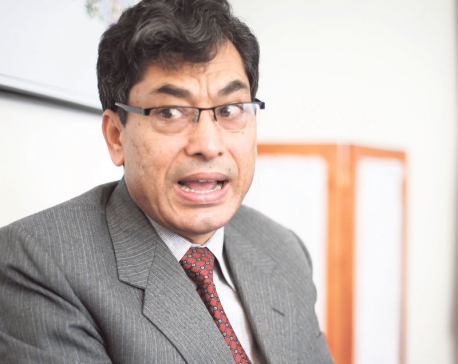
OR
There is an environment to justify supplementary budget
November 14, 2016 00:10 am
The National Planning Commission (NPC) is the apex advisory body of the government for formulating a national vision, periodic plans and policies for development. It serves as a central agency for monitoring and evaluating development plans, policies and programs. Despite the NPC taking a lead role in the formulation of planning as well as monitoring of development projects, the implementation aspect has remained weak as reflected in the failure to boost capital expenditure. Sagar Ghimire and Laxman Biyogi of Republica talked with Min Bahadur Shrestha, the vice chairman of the NPC, on the problems in project planning and implementation as well as the government plan to bring supplementary budget. Excerpts:
Justify it
June 6, 2016 16:48 pm
Whether or not there was a 'gentleman's agreement' (and we suspect there was one) between CPN-UML and now CPN (Maoist Center) on government change, we don't see any rationale for Prime Minister KP Sharma Oli passing the baton to Maoist supremo Pushpa Kamal Dahal if Dahal, too, will head a coalition government. A change of government only makes sense if Dahal, or some other political leader, enjoys the support of the three major parties as well as the protesting Federal Alliance and can hence form a government of national unity. For it won't be possible to amend the new constitution to address the concerns of the protesting alliance without the support of either Congress (the largest party in parliament) or UML (the second largest). Which is why rather than getting into an argy-bargy over the gentleman's agreement, the major political forces must urgently work towards a government of national unity. The question of who gets to lead such a government—Oli, Dahal or Congress President Sher Bahadur Deuba—will in that case be of academic interest.
Trending
Just In
- Nepal’s population growth rate drops to 80-year low at 0.92 percent per annum in the past decade
- Exploring the Game-Changing Potential of Sports Diplomacy Between India and Nepal
- Bagmati govt to issue an ordinance on education
- Japan's foreign minister returns home
- Bajhang by-election report presented to Province Chief
- Bagmati province observes public holiday with formal introduction of Tamang and Newari as official languages
- Rights watchdog urges prompt rescue of war victims
- Japanese Minister calls on President












